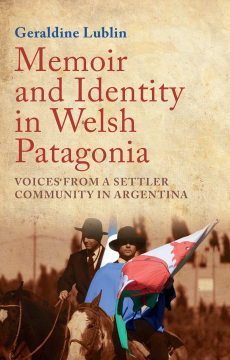
Additional Information
Book Details
Abstract
This literary investigation of identity construction in twentieth-century Welsh Patagonia breaks new ground by looking at the Welsh community in Chubut not as a quaint anomaly, but in its context as an integral part of Argentina. Its focus is on historicising and problematising the adoption of the so-called ‘Welsh feat’ as foundational narrative for Chubut and its settler colonial implications in the larger settler colonial formation that is Argentina, where indigenous re-emergence seems to be leading the way towards real pluralism. Exploring the understudied period immediately preceding the celebrated turn-of-the-century revitalisation, Memoir and Identity in Welsh Patagonia presents four memoirs written in Welsh and Spanish by Welsh Patagonian descendants, read against the grain to foreground the tensions, dissonances and ambivalences emerging from the individual narratives. The study then probes the romanticised stereotype of the Welsh descendant so prevalent in media representations, in order to describe a broader, richer panorama of what it means to be a Welsh descendant in Patagonia in a modern Argentine context.
Table of Contents
| Section Title | Page | Action | Price |
|---|---|---|---|
| Front Cover | Front Cover | ||
| Title Page | iii | ||
| Copyright Page | iv | ||
| Contents | v | ||
| List of Illustration\r | vii | ||
| Acknowledgements | ix | ||
| Chapter 1: Introduction\r | 1 | ||
| A snapshot of the history of Y Wladfa | 4 | ||
| Memoir and memory | 15 | ||
| Chapter 2: Writing Welsh Patagonia\r | 21 | ||
| Y Wladfa in its Argentine context | 24 | ||
| Marking Welshness in Chubut | 32 | ||
| Chapter 3: Valmai Jones (1910–1994) – Anxiety about Welshness\r | 43 | ||
| Valmai Jones (1910–1994) | 44 | ||
| Atgofion am Y Wladfa | 46 | ||
| Between Wales and Argentina | 49 | ||
| In (and away from) the melting pot | 57 | ||
| Patagonian Welshness and diasporic belonging | 62 | ||
| Oscillating within Welshness | 74 | ||
| Closing points | 77 | ||
| Chapter 4: Fred Green – The Welsh Patagonian Gaucho\r | 79 | ||
| Fred Green (1913–2002) | 80 | ||
| Pethau Patagonia | 82 | ||
| A sense of Welshness | 84 | ||
| A sense of Patagonian Welshness | 87 | ||
| Patagonian ‘welsh’ | 96 | ||
| The ‘lasting friendship’ | 102 | ||
| Closing points | 113 | ||
| Chapter 5: Juan Daniel Moreteau – Welshness Disowned\r | 115 | ||
| Juan Daniel Moreteau (1915–2006) | 116 | ||
| Tres etapas de una vida | 119 | ||
| Disowning Welshness | 121 | ||
| Opposing Welshness | 131 | ||
| Claiming Argentineness | 135 | ||
| Closing points | 144 | ||
| Chapter 6: Carlos Luis Williams – Ineradicable Welshness\r | 147 | ||
| Carlos Luis Williams (1953–) | 149 | ||
| Puerto Madryn y el triunfo de mis Padres: El Amor | 151 | ||
| ‘Organic’ Welshness | 153 | ||
| Religion, music and other markers of Welshness | 159 | ||
| Wales as ancestral homeland and the Patagonian melting pot\r | 169 | ||
| Patagonia’s indigenous peoples | 176 | ||
| Closing points | 181 | ||
| Chapter 7: Conclusion\r | 183 | ||
| Notes | 195 | ||
| Works Cited | 251 | ||
| Index | 265 | ||
| Back Cover\r | Back Cover |
